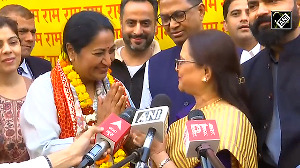An Iraqi child, who suffered 60 per cent burns and lost both his arms after an American bomb struck his home, has been flown to Kuwait for treatment.
Surgeons at the Khairallah Hospital in Baghdad, which has been flooded with victims of the war, were looking after the 12-year-old orphan, Ali Ismail Abbas.
Television images of him lying on a hospital bed had triggered sympathy and a lot of people from around the world had offered to help him.
In Kuwait, the authorities have set aside an intensive care room at the Ibn Sina Hospital.
A spokesman for the Ministry of Health, Dr Ahmad al-Shatti, said doctors would do everything to tend to the child's injuries.
"He will have the best possible treatment. If he arrives at the right time I think he will be stabilised and saved," he said in a statement.
"He will be taken to intensive care at the burns unit and assessed thoroughly.
"The immediate concern will be to clean his burns and nourish him."
Because of his burns and the severity of his injuries, there were fears that Ali would die without specialised treatment.
A number of Iraqi children have been flown to other countries for treatment. Two of them, including a badly burnt six-month-old girl from Basra, are in Britain.
Dr Shatti said eight other Iraqi children, including a five-year-old girl from Baghdad, are being cared for in Kuwait.
He said Ali's plight had touched the hearts of Kuwaitis.
"I was in meeting this morning and everybody was talking about it."
In comments broadcasted on Arab radio stations, he said it was difficult at this stage to say what surgery Ali would undergo. "We have to see him. I'm very optimistic."
The Kuwaiti authorities have still not decided whether they would allow an American television crew to bring an orphan found in Baghdad.
A member of the television team has indicated he wishes to adopt the child and take him back to the US, but much will depend on whether he is first allowed into Kuwait.
Rediff.com Senior Editor Shyam Bhatia is the co-author of Saddam's Bomb, on Iraq's search for nuclear weapons






 © 2025
© 2025